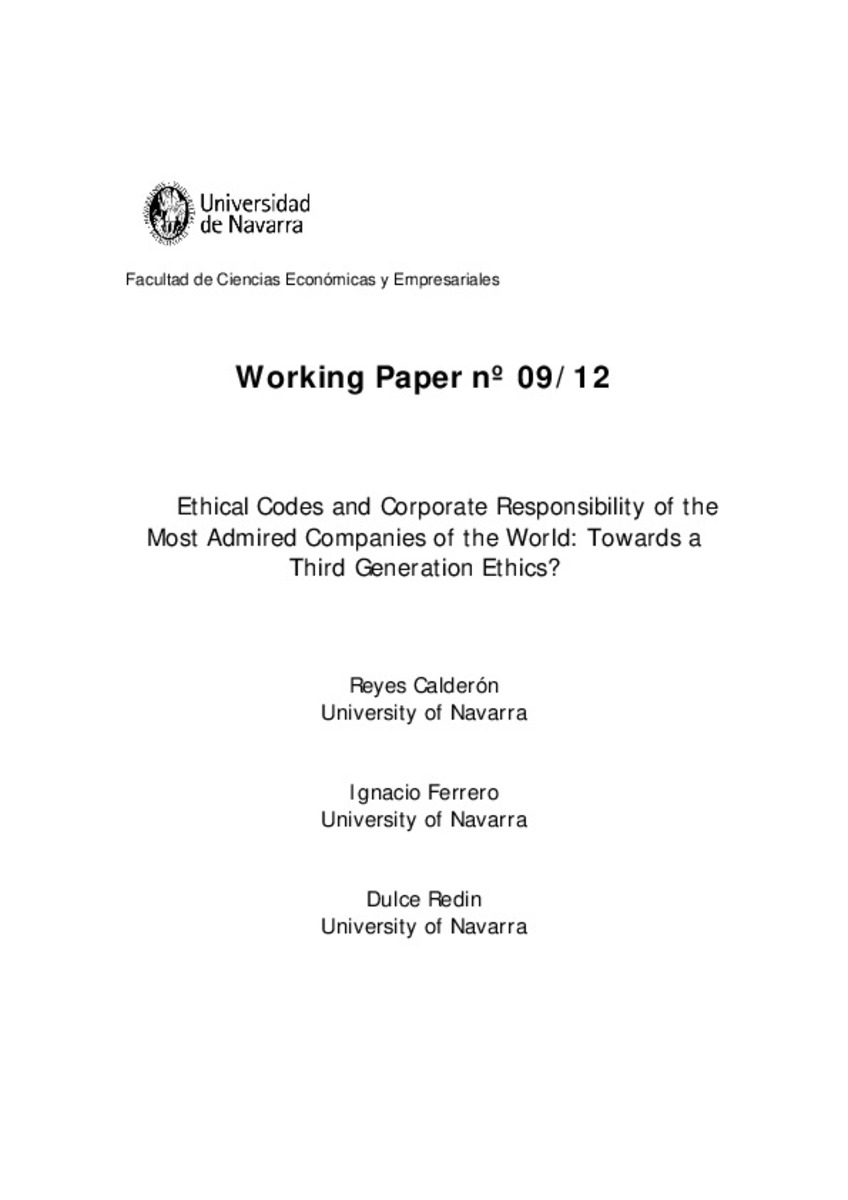Registro completo de metadatos
| Campo DC | Valor | Lengua/Idioma |
|---|---|---|
| dc.creator | Calderón-Cuadrado, R. (Reyes) | - |
| dc.creator | Ferrero-Muñoz, I. (Ignacio) | - |
| dc.creator | Redin-Goñi, D. (Dulce) | - |
| dc.date.accessioned | 2017-03-24T14:59:38Z | - |
| dc.date.available | 2017-03-24T14:59:38Z | - |
| dc.date.issued | 2012 | - |
| dc.identifier.citation | Calderón, R. (Reyes); Ferrero, I. (Ignacio); Redin, D. (Dulce). "Ethical Codes and Corporate Responsibility of the Most Admired Companies of the World: Towards a Third Generation Ethics?". En . , 2012, | es |
| dc.identifier.uri | https://hdl.handle.net/10171/43127 | - |
| dc.description.abstract | Manuscript Type: Empirical. Research Question/ Issue: Codes of ethics contain a set of rules of conduct and corporate principles concerning the responsibility to stakeholders and shareholders, which help guide corporate and employees' behavior, and they constitute verifiable elements of social responsibility. Given the growing concern for social responsibility and for the relationship with external stakeholders, which has become an undeniable social demand, we think that the codes of the most respectable and admired companies should reflect this trend. This study looks into the Most Admired Companies of the World ranked by Fortune magazine in 2009 to find out if their codes of ethics exhibit greater emphasis on social responsibility and strong implementation processes, and whether they could be considered codes of the third generation. Stohl et al. (2009) suggest that the codes of ethics of the most advanced companies should evolve to the third generation ethics', which focuses on the long-term perspective and on the global, social and environmental aspects of corporate responsibility sensibility. Research Findings/Insight: Our results show that the codes of ethics of the 2009 Most Admired Companies of the World resemble codes of conduct rather than strictly codes of ethics or codes of corporate social responsibility. They are still governed by traditional norms related to immediate economic success, normative compliance, internal management and the pressing effects of their sector. Theoretical/Academic Implications: This study provides empirical support for the idea that the philosophy of corporate social responsibility (CSR) is scarcely present in the codes of the most reputable companies. | es_ES |
| dc.language.iso | eng | es_ES |
| dc.rights | info:eu-repo/semantics/openAccess | es_ES |
| dc.subject | Materias Investigacion::Economía y Empresa | es_ES |
| dc.subject | Codes of Ethics | es_ES |
| dc.subject | Corporate Social Responsibility | es_ES |
| dc.subject | Corporate Governance | es_ES |
| dc.subject | Third Generation Codes | es_ES |
| dc.title | Ethical Codes and Corporate Responsibility of the Most Admired Companies of the World: Towards a Third Generation Ethics? | es_ES |
| dc.type | info:eu-repo/semantics/article | es_ES |
Ficheros en este ítem:
Estadísticas e impacto
Los ítems de Dadun están protegidos por copyright, con todos los derechos reservados, a menos que se indique lo contrario.






